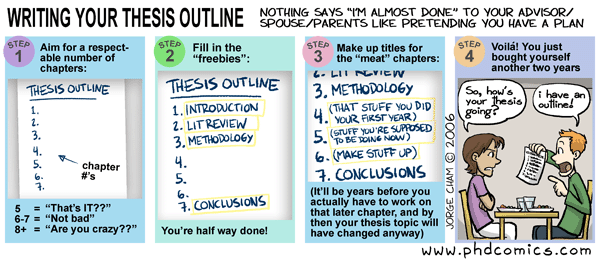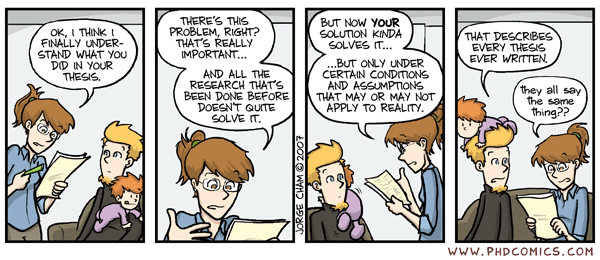Saideman's Biases
Basic Expectations for Dissertation
Norms of Interaction
Ingredients for
Successful Dissertation Proposal
Considering Applying to McGill's Grad Program?
Saideman’s Biases
I believe in methodological and theoretical pluralism. What matters most is that the work is interesting and well-executed. However, given my own experience, I am a suitable adviser for only positivist dissertations. That is, I expect students to develop falsifiable arguments that seek to generalize about some kind of political phenomena. I am not an appropriate advisor for someone who wants to do a post-modern critique or for someone who is interested in a single case of something but not in thinking more broadly about it. Likewise, the dissertation should not be normative (not about should or should not) but analytical (why, why not). If you are interested in a normative dissertation, see the political theorists in the department.
My students do not have to be rationalists or rational choice theorists (these terms and groups of people are not identical), but my work largely considers how actors (individuals, groups, states) face difficult choices and try to pick the best ones. I prefer deductively derived theories, but induction is appropriate if done well.
My interests cross fields—both IR and Comparative Politics. However, I am not an expert in all questions in both fields. In IR, my expertise lies in comparative foreign policy, intervention into civil conflicts, and security in general. There are others in the department who are more expert in some security issues (proliferation, arms control) and in all IPE issues. In terms of Comparative Politics, I study ethnic conflict, particularly separatism and elite political competition as mediated by institutions, but am not an expert on social movements. I know some about Eastern Europe, specific African and South Asian countries for certain periods of time, but I am not a country expert of any kind.
Basic Expectations for the Dissertation

Dissertations are largely puzzle driven—that is, there is some question, some anomaly that needs explanation. It could start with theory—does this theory explain something else? How do these theories compare to each other? Or, it could start with some empirical anomaly. What is this a case of? Why does this pattern of behavior develop?
A dissertation (or a thesis) is not a speculation about future events, but an examination of past behavior (case studies, quantitative analyses, etc) to determine the patterns of causation. The dissertation should not examine an event in progress, as this will make completion difficult or impossible.
The dissertation should be interesting—that it address a question that is relevant for theory and for policy. My view of social scientists is of scholars who seek to understand reality not just for their own benefit but to improve their surrounding society. However, the goal of policy relevance should not drive the findings, but that the student ought to consider the policy implications of the findings.
The dissertation should be interesting to you—it will consume much of your time and energy not only until you finish it but beyond, as your first several years of publications and teaching will still focus on your dissertation.
The dissertation will probably take two or more years to complete. Rushing a dissertation is a bad idea, as it is the foundation for your career. It establishes your reputation, sets your research agenda, and may provide more than a few publications for yourself. However, one should not dawdle either, as funding has a nasty tendency to be time-based and to run out.
The dissertation will not include everything that you researched. Some stuff, it turns, will not be relevant. Just because you read something or ran a particular analysis does not mean that it is relevant.
Norms of Interaction
1. Do not expect instant feedback. Do not turn in drafts expecting comments immediately or expecting a defense of the proposal or the dissertation within days. The professors on your committee take their own duties and your dissertation seriously, so expect that they will have other things to do and that they will take some time reading your stuff thoughtfully.
2. Take seriously the feedback you receive. If you have a fixed idea of what you are going to do and how you are going to do it, find someone else to rubber stamp it. Social science is an incredibly social effort—you will get feedback your entire career (reviews from journals to say the least). If you do not respond to constructive criticism in a productive manner (you can disagree, but you need to disagree constructively), then your work will rarely develop and improve.
3. Do not appear in my office five minutes before I have a class. Schedule your appointments so that we can focus on your work, and make sure that you hand in the written work with enough time so that it can be read before the appointment (see #1).
4. Please double space all drafts, bind, include a header on each page that has your name, a chapter title/phrase, and page numbers. If you are at McGill, please print out the chapters and give them to me or put them in my box. Email attachments are ok if you are working elsewhere, as long as I can open them (MsWord, PDF files are easiest) and virus-free. If you send me one file with a virus, I will no longer accept attachments from you—it will have to be paper from then on.
** New rule: No chapter should be more than 45 pages. If any chapter is significantly longer than what an article would be, then revise. Do not submit chapters to me before you have edited them--which not only refers to improving the writing but seriously reading the chapter and dropping all that which is not relevant. The less you waste my time, the quicker I can get comments back to you.
5. I check my email very frequently, so that is the easiest way to reach me. I check my office phone messages less frequently, and my mailbox in the political science office much less frequently.
6. If you want me to write you a letter of recommendation, please give me a CV/resume, a self-addressed envelope and whatever forms that are necessary. If it is for further educational work, internship, or job, please provide a paragraph describing your goals and the program/position. And see my instructions for letters on this website, although letters for grad and undergrad students will differ.
7. Expect both emails and handwritten comments on your drafts. The latter will be hard to read and may need some de-ciphering.

Ingredients for Successful Dissertation Proposal
-
A question.
-
A literature review—not just a summary of the stuff you read, but rather an assessment of how the question has been asked before--the strengths and weaknesses of previous attempts to answer the question (again, not everything that you thought would be relevant is). The review also sets the context—how does your question fit into larger questions of interest to scholars in the field.
-
An answer—your theory. It should not float from nowhere, but should emerge logically from the literature review—building on previous work, borrowing theory from other areas (other issues in the subfield, other subfields, other disciplines). Your theory can have more than one or two variables in it, and it does not have either be Realist or anti-Realist, but it needs to be logically coherent. It should be falsifiable—under what circumstances would your theory be wrong?
-
Testable hypotheses (If x, then y). These should be derived from your theory.
-
A methodology. The proposal should explain and justify how you will test your hypotheses. No single method is always the best for all topics and questions. You will have to figure out which method or methods will work best. If doing case studies, you should consult the literature on qualitative methods (see my old syllabus for some hints) to determine strategies of case selection. If doing quant work, research the availability of datasets and think carefully about how you will operationalize your concepts. Consider which kinds of techniques you will have to learn.
-
Some thought about policy implications.
-
Iterations—your first dissertation proposal will not be your last. It will evolve over time, after you receive comments on previous version.
Considering Applying to McGill's Grad Program
Since moving to McGill, I have received many emails from students in Canada and around the world asking me about the graduate program and seeking to work with me. While this is flattering, our system does not work this way. Students apply to the department. If they are accepted and decide to come, then they find advisors generally. I do not "Cherry-pick" files and push them through the process. So, do not email me about yourself since it will not help you. The department and university websites have a great deal more accurate information about the graduate programs here than I possess. If you get in, then feel free to email me then.
